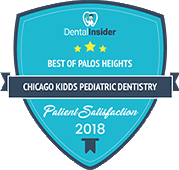FAQs About Dentistry for Kids in Palos Heights & the Surrounding Areas
- What is a pediatric dentist?
- A pediatric dentist is a dentist who extends their education to learn precisely how to work with and on children’s teeth. They work with patients from the age of infancy to teenage years.
- What possible dental issues could your child have?
- There are many dental problems that occur frequently in children. Some of these conditions include, but are not limited to, cavities, gum disease, tooth decay caused from habits like drinking from a bottle for too long, etc.
- Why are the primary teeth important?
- Primary teeth, also known as baby teeth, are vital to the development of a child’s permanent teeth and their oral habits. If primary teeth are neglected, issues such as cavities and inflamed gum tissue can affect the permanent teeth. Primary teeth aid children in eating, speaking, jaw development, and allow permanent teeth to eventually slide into the proper placements.
- How can you prepare your child for their first dental visit?
- When talking to your child about their first dental appointment at a pediatric dentist near Chicago, remain relaxed and do not use frightening terminology, such as “needle” or “drill.” If your child thinks you are nervous, they will be nervous, too. Make sure they know it will not be a scary experience. At Chicago kiDDS Pediatric Dentistry, we make sure to send new patients an activity/coloring book they can look at before their appointment, which can help you teach your child about the dentist.
- You can learn more about how to talk to your child about their first dental visit here.
- When will your child’s teeth erupt?
- The first baby tooth typically erupts in children around six months of age, or before their first birthday. Usually, all twenty primary teeth emerge by age three, however, there are exceptions. Permanent teeth start to emerge around age six, in most cases. Wisdom teeth usually do not start to erupt until the late teenage years.
- What constitutes a dental emergency?
- Many situations can fall under the definition of a dental emergency. Some examples include a tooth being knocked out, chipped or cracked, a bite wound or cut to the tongue, cheek, or lips, toothache, injured jaw, and head injury.
- If a permanent tooth has been knocked out, try to find the tooth and handle it only by the crown. Then, rinse it with clear water, and place it back into the tooth socket and contact your dentist. If you cannot place the tooth back into the socket, place it in a cup filled with milk or the child’s saliva and contact your dentist.
- In cases of jaw and head injury, take your child to the emergency room immediately.
- Knocked Out Baby Tooth: Contact your pediatric dentist during business hours. This is not usually an emergency, and in most cases, no treatment is necessary.
- Why are Dental X-Rays (Radiographs) important?
- Dental x-rays are vital to protecting your child’s teeth. They are used by dentists to find problems that cannot be seen during a regular dental exam, assess injuries, survey erupting teeth, diagnose bone diseases, and plan out orthodontic treatments. They also help dentists to detect problems early on, which lessens the amount of time your child will spend in the dental chair.
- The risks associated with radiation exposure during dental x-rays is minor compared to the health risks that come with dental issues being left untreated. Also, many new advancements help protect young patients from x-ray radiation, including lead aprons and shields, and current safeguards which minimize the amount of radiation emitted during dental x-rays.
- How can you tell if your child is grinding their teeth?
- Teeth grinding, also known as Bruxism, can often show itself in uneven tooth wear. If your child’s teeth are being excessively worn down, make an appointment with your pediatric dentist.
- Is thumb sucking a danger to your child’s teeth?
- If your child is still sucking their thumb by the time that their front adult teeth begin to emerge, it is time to try and rid them of the habit. Thumb sucking, pacifiers, and bottles can lead to serious consequences for children’s teeth after a certain age, and especially when they fall asleep with them.
- What is pulp therapy?
- Pulp therapy is also known as the “children’s root canal” and is a way to preserve a child’s tooth when it has been injured or is housing a deep, often painful cavity. There are two common kinds of pulp therapy used in pediatric dentistry, including a pulpectomy and a pulpotomy.
- When is the right time for your child to undergo orthodontic treatment?
- Orthodontic treatment can start as early as age two, if your dentist recognizes potential for serious dental issues down the road.
- How can you help your child prevent cavities?
- Make sure your child brushes their teeth twice a day, and help them floss. For infants, gently clean emerging teeth and gum tissue with a damp cloth. Decrease sugar intake, and do not allow your child to go to bed with a bottle or sippy cup unless it is filled with clear water. Finally, visit your pediatric dentist regularly.
- How important is dental care during pregnancy?
- Research has shown that periodontal disease in pregnant women can negatively impact a child’s birth weight, and increase the chances for premature birth. Also, women with cavities can transfer cavity causing bacteria to their unborn children. It is important to visit the dentist regularly while you are pregnant and maintain good oral hygiene practices.
Contact Us
Contact Chicago kiDDS Pediatric Dentistry today and set up an appointment with one of the best pediatric dentists in Chicago.












